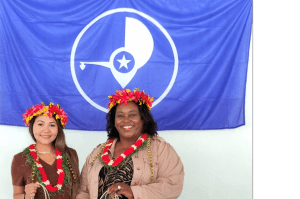Zena Sablan and Jackysha Green Lead a Teacher Education Workshop in Micronesia

The Yap States in Micronesia, an archipelago in the western Pacific Ocean, is renowned for its vibrant community and cultural heritage. For this engagement activity, the focal group consisted of elementary school teachers from across the Yap States. The workshop was held at the Yap Department of Education (DOE) in partnership with the University of Guam. The aim was to integrate key subject areas—reading, math, science, fine arts, social studies, and physical education—into a unified curriculum, focusing on the pressing issue of drought affecting the island.
Preparation for the workshop involved a collaborative effort between the University of Guam and the Yap DOE. Professors from the University, leveraging their expertise in elementary education, worked closely with local educators to develop relevant content. This partnership facilitated the creation of problem-based, place-based lesson plans centered around the theme of drought. These plans were tailored to Yap’s environmental and cultural context to ensure that they would be both engaging and applicable. The preparation process included designing interactive materials and strategies for hands-on activities and group work. The objective was to provide teachers with practical tools and approaches that they could use in their classrooms. Importantly, the workshop also aimed to offer teachers opportunities to practice and present their skills, preparing them for future professional development sessions within their region. The workshop was structured to be interactive and comprehensive. It featured breakout sessions focused on different subject areas, each exploring how to integrate the drought theme into lesson plans. For instance, the science session examined the ecological impacts of drought, while the social studies session explored historical and cultural aspects of water management in Yap.
During the sessions, teachers worked in small groups to develop and refine lesson plans that addressed the drought issue while incorporating multiple subject areas. These lesson plans were designed to be both place-based, utilizing local resources and knowledge, and problem-based, encouraging students to engage with real-world issues. The workshop provided a platform for teachers to practice and present their developed lesson plans, fostering collaboration and preparing them to share their expertise in future professional development opportunities.
The workshop received positive feedback from participants. Teachers found the integration of subject areas around a common theme to be highly effective. The problem-based, place-based approach resonated well, making the content more relevant and engaging for students.
One significant outcome was the creation of lesson plans that interwove various subjects with the drought theme. These plans are set to be implemented in classrooms across Yap, enriching the educational experience. Additionally, the workshop successfully prepared teachers to present their lesson plans to peers, fostering ongoing professional development and collaboration within the region.
The workshop was a success in achieving its goals. The integration of diverse subject areas through a real-world issue proved to be an effective strategy for engaging teachers and students. The opportunity for teachers to practice and present their skills was particularly valuable, equipping them to share their insights with colleagues in future professional development sessions.
There are areas for improvement. Some teachers suggested more time to delve deeper into each subject area and to refine their lesson plans further. Future workshops could benefit from extended sessions or additional follow-up opportunities to provide teachers with ample time for development and practice.
We extend our sincere thanks to the Yap Department of Education for hosting this workshop and to the University of Guam for their critical support and expertise. The partnership between the University and the Yap DOE was instrumental in providing teachers with the chance to practice and present their skills effectively. We also appreciate the dedication of the participating teachers, who are committed to enhancing education in Yap and embracing innovative teaching methods.
About the Blog
Discussion channel for insightful chat about our events, news, and activities.
Categories
Featured Posts
Tag Cloud
- STEMCAP (1)
- tattoos (1)
- dinosaurs (1)
- microscopy (1)
- conservation (2)
- education (1)
- Puerto Rico (2)
- bilingual (1)
- UoG (2)
- Guam (2)
- ethnobotany (1)
- environmental policy (1)
- student immersion (1)
- engineering (1)
- Virgin Islands (1)
- USVI (2)
- lionfish (1)
- children's home (1)
- marine ecology (1)
- youth (1)
- sustainability (2)
- Utah (1)
- Arizona (1)
- Nevada (1)
- southwest (1)
- virtual (1)
- project management (1)
- training (1)
- naturalist (1)
- forest (1)
- ecosystem (1)
- Spanish (1)
- library (1)
- Huntington's (1)
- medical science (1)
- Emmanuel Ngwoke (1)
